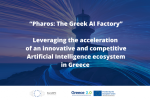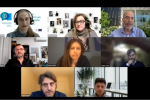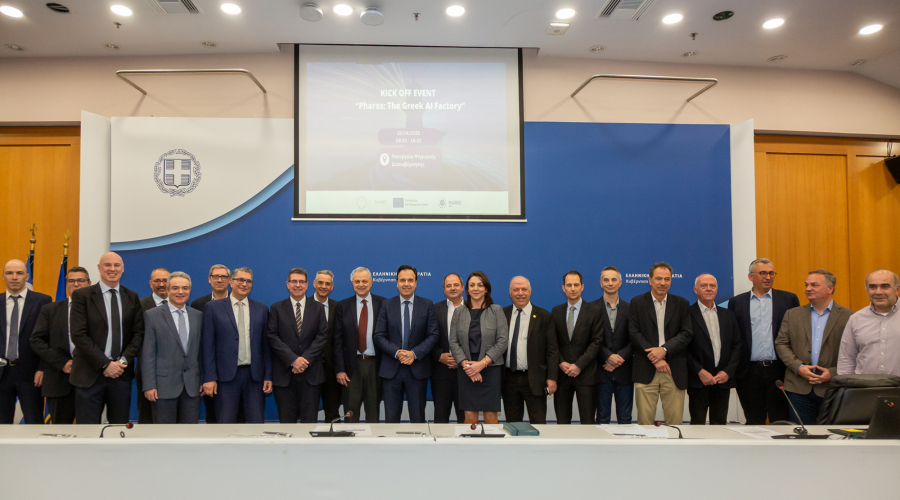
The inaugural event of the landmark project “Pharos – The Greek AI Factory for accelerating AI innovation” took place on Tuesday, April 15, 2025, at the Amphitheater of the Ministry of Digital Governance, in the presence of all participating organizations, academic and research institutions, including the National Documentation Centre (EKT). The event marked the official launch of an ambitious initiative aimed at promoting innovation, entrepreneurship, and applied research, with artificial intelligence as its driving force.
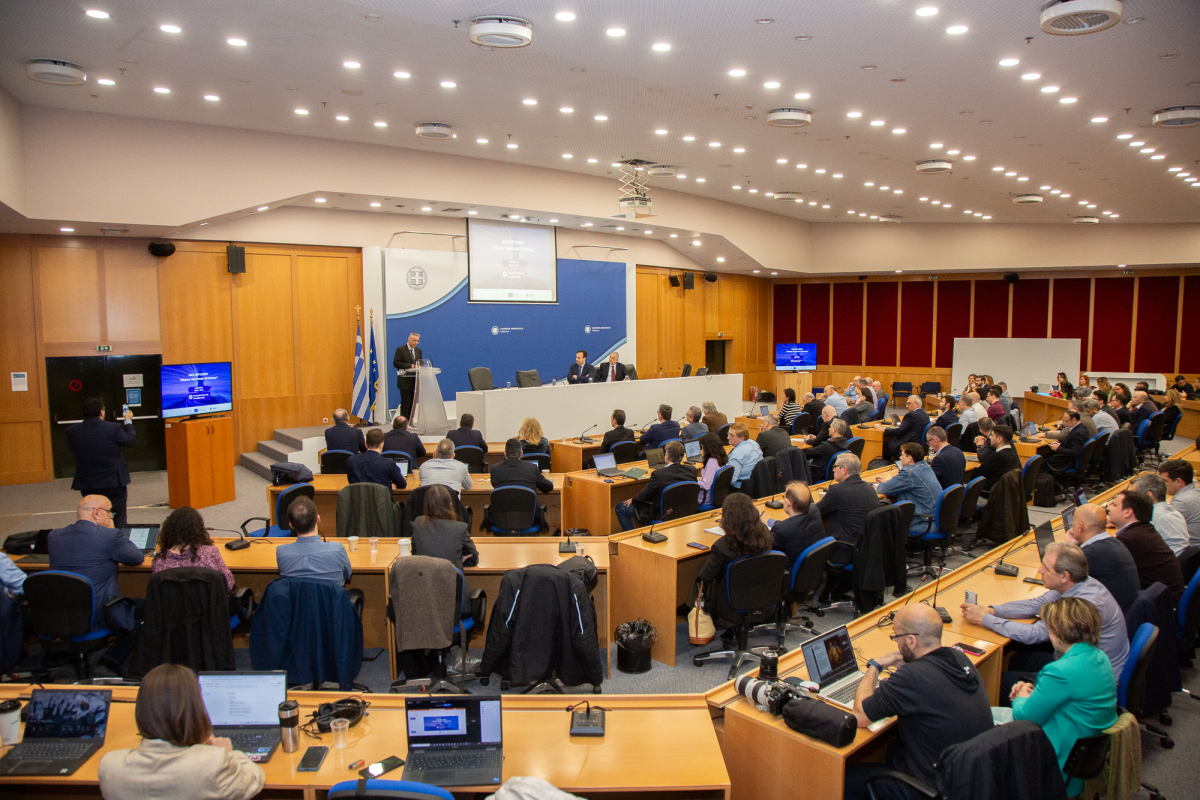
Pharos is one of the first thirteen Artificial Intelligence "Factories" in Europe and represents a strategically important initiative, as it strengthens competitiveness, the development of trustworthy AI applications, and the promotion of innovation with a focus on sustainability.
It is a project with a total budget of €30 million, implemented under the Horizon Europe program and co-funded 50% by the EuroHPC Joint Undertaking and 50% by national resources. The project will be implemented over a period of 36 months.
More specifically, the AI “Factory” will provide computing power, advanced AI tools, large-scale datasets, and specialized human resources to startups and SMEs, academic institutions, research centers, and public sector organizations. This will enable them to develop AI applications in key sectors such as Health, Greek Language and Culture, and Sustainable Development. Example applications include:
- A research organization may use anonymized data collected through appropriate methods, along with the computing power of the “Daedalus” supercomputer, to develop personalized medicine applications—such as medical image analysis systems using AI.
- A startup, in collaboration with a university, could use the text data and open language models provided by Pharos to develop digital assistants that help citizens understand complex administrative procedures or better support individuals with disabilities.
- An SME could use Pharos tools to analyze satellite data, aiming to improve the management of natural resources or to provide more accurate, localized forecasts of natural disasters.
It is worth noting that the new national supercomputer, “Daedalus,” will serve as the computing platform of the AI Factory. With a total computing power of 89 Pflops, a significant portion of its capacity will be dedicated exclusively to AI applications through Pharos.
The National Documentation Centre (EKT), with its rich datasets in science, culture, scientific terminology, and language resources—and in its role as the National Aggregator of Cultural Content via its SearchCulture.gr infrastructure—will participate in initiatives related to the Greek Language and Culture domain. These actions include, among others:
- the establishment of Greek Data Spaces for Language and Cultural Heritage in alignment with their European counterparts,
- the collection of training data for the creation of a large-scale Greek language model,
- the further aggregation of cultural data from Greek cultural institutions,
- and the creation of a toolkit comprising datasets, services, and AI models for use and reuse by SMEs and organizations active in the fields of culture and the humanities.
Additionally, EKT will play an active role in the communication and dissemination of the project's actions and outcomes.
During the launch event, participants emphasized the importance of collaboration between the public and private sectors, as well as academic and research institutions, in creating open and trustworthy AI tools for the benefit of all European economies.

The Minister of Digital Governance, Dimitris Papastergiou, stated: "With the AI Factory, we are joining forces so that through the combination of infrastructure, data, and skills, we can provide opportunities to startups, research centers, and universities to develop AI-based solutions. This is not an inward-facing public sector project; on the contrary, our goal is for the AI Factory to act as a driver of outward-looking growth. Together—public and private sectors—we aim to harness AI for the country’s development, to work collaboratively, and to retain our talented human capital in Greece. It is especially important that many institutions are eager to actively participate in this endeavor. A prime example is the Hellenic Parliament, one of the most fundamental institutions of democracy, which will contribute to the implementation of the pillar related to the Greek language and culture, as confirmed to me by the President of the Parliament, Nikitas Kaklamanis, during our recent meeting. We are moving forward decisively, all together, toward a digitally strong and pioneering Greece.”
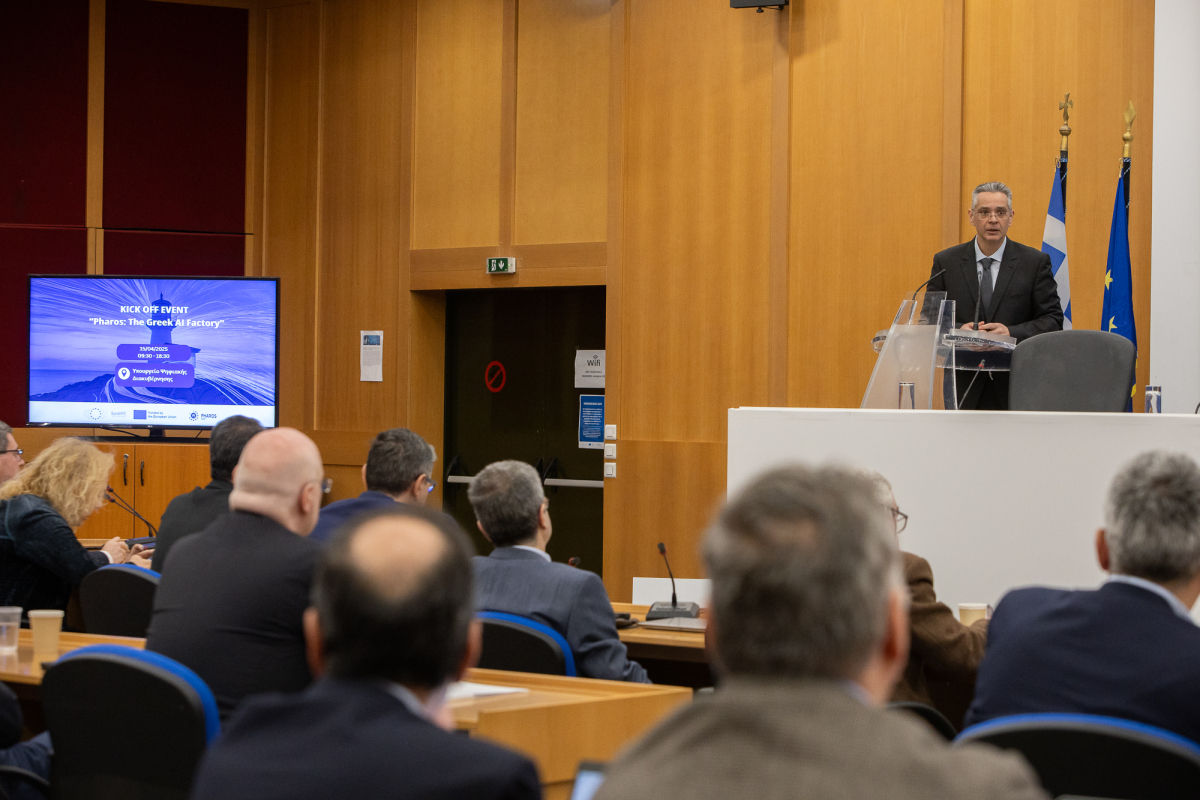
The Special Secretary for Long-Term Planning and Coordinator of the National AI Advisory Committee under the Prime Minister, Giannis Mastrogeorgiou, stated: "This project brings together Greek universities, research infrastructures, and the market. It is proof that Greece can create, export, and lead in cutting-edge technologies."
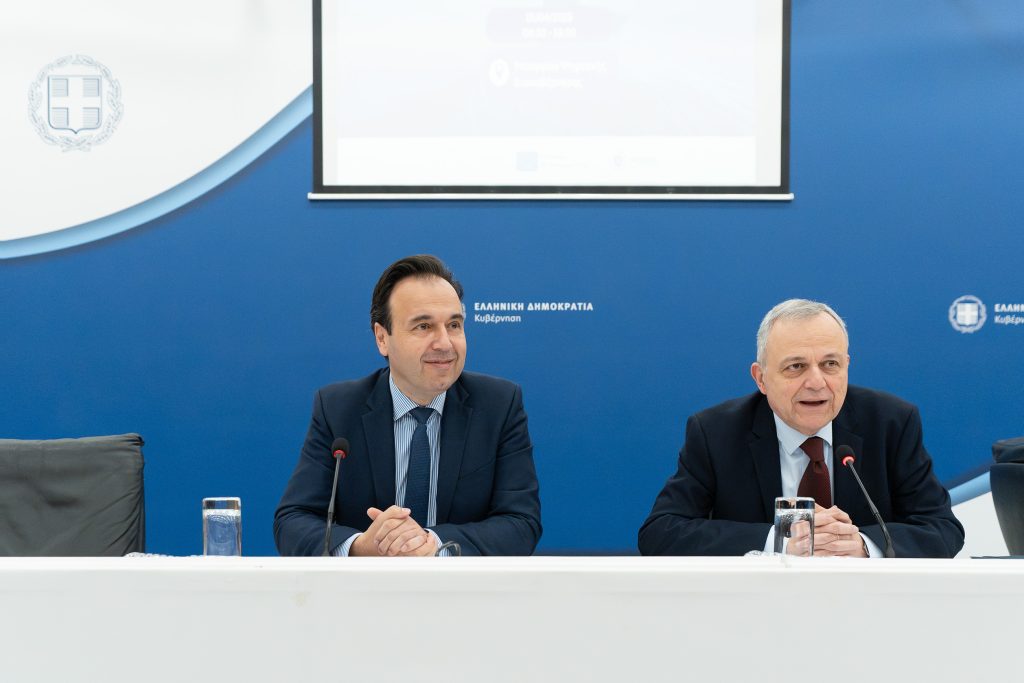
Emeritus Professor Stefanos Kollias, Chairman of the Board of GRNET and Project Coordinator, stated: "The AI Factory Pharos is not just a project; it is a platform for the scientific and technological advancement of our country. We are combining knowledge, technology, and collaboration to shape a future that fully leverages the potential of artificial intelligence, with a human-centered approach."
Anders Jensen, Executive Director of the EuroHPC Joint Undertaking, said: "The AI Factory Pharos initiative will strengthen Europe’s leadership in artificial intelligence. I welcome it, as well as Greece’s commitment to participating in the European AI and High-Performance Computing (HPC) ecosystems."
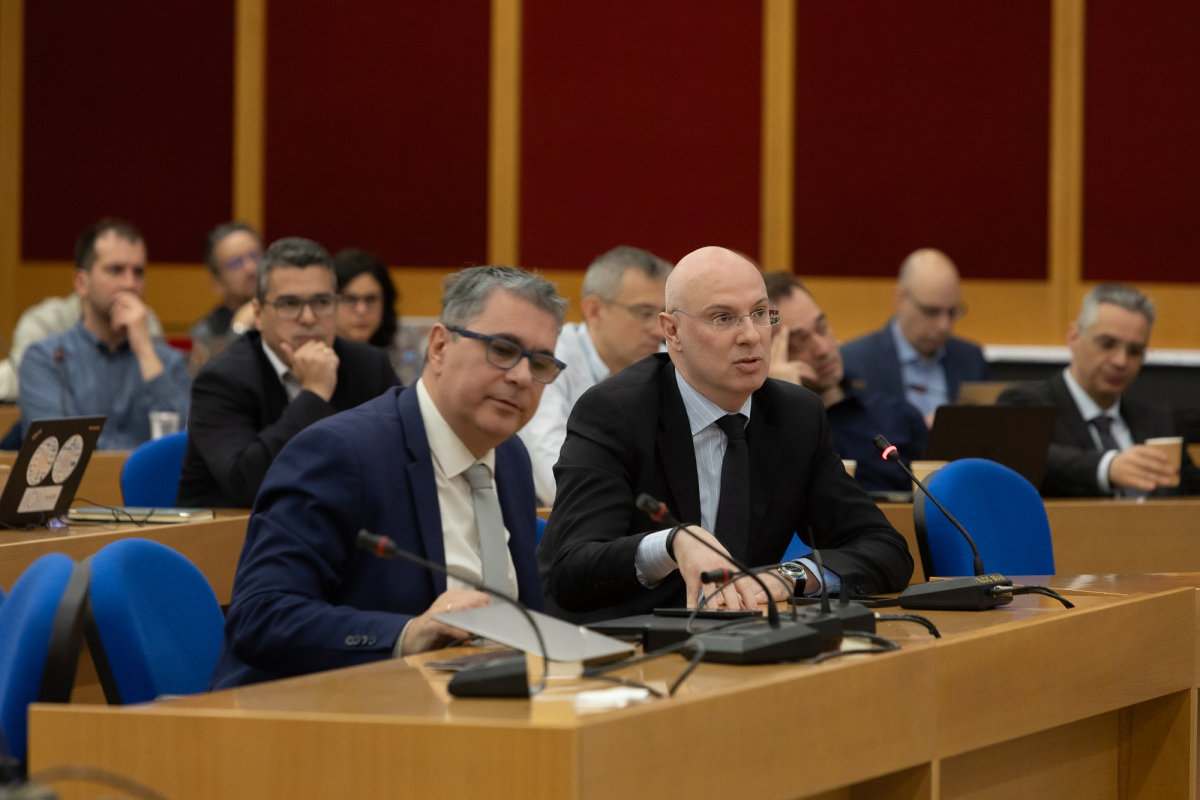
During the inaugural event, Dr. Kyriakos Tolias, Director of the National Documentation Centre (EKT), stated in his welcome address: "It is a great honor and joy for us to participate in this important moment for innovation and artificial intelligence in our country. The launch of Pharos is proof that Greece can and is actively claiming a leading role on the European digital map. EKT, with its rich datasets in science and culture, will take part in activities related to the Greek Language and Culture. Through SearchCulture.gr, the open public portal that aggregates and connects digital cultural collections—featuring over 1 million items—we will contribute to this direction. At the same time, EKT, as the National Authority of the Hellenic Statistical System for Research, Development, and Innovation, will support the assessment and evaluation of the project throughout its duration. We sincerely thank the exceptional project team, which I do not hesitate to call a true 'Team Greece'.”
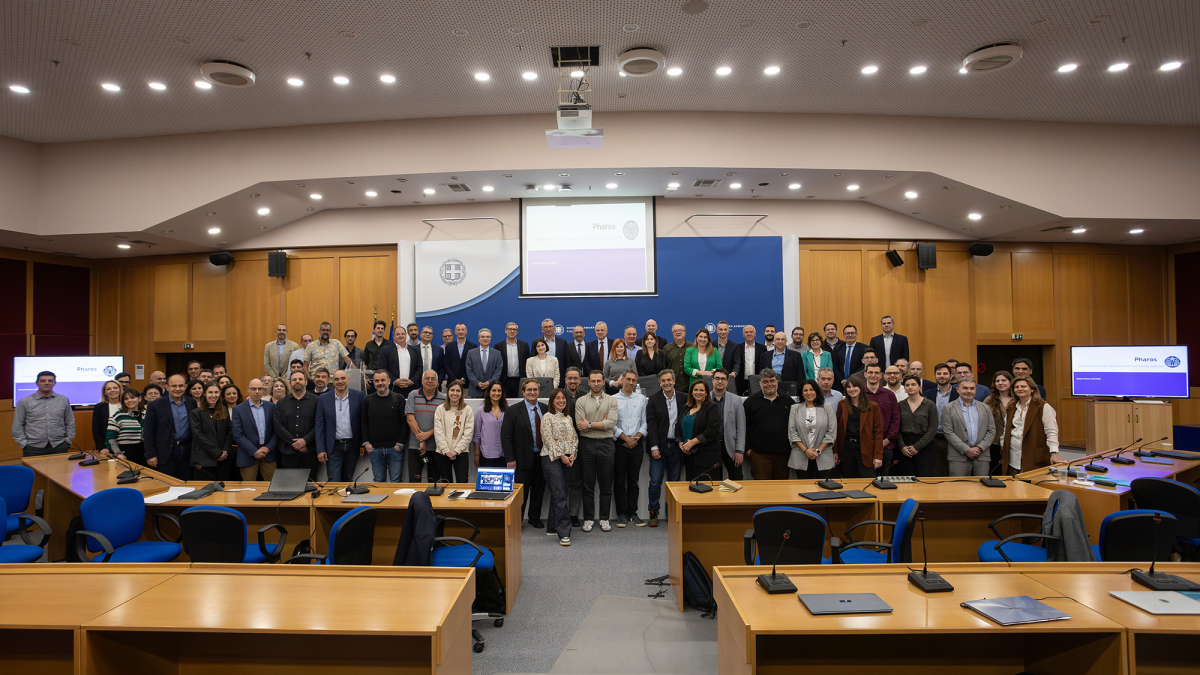
Pharos is being implemented by a national consortium led by the National Infrastructures for Research and Technology (GRNET S.A.), with partners including the National Center for Scientific Research “Demokritos” (NCSR-D), the National Technical University of Athens (NTUA), the Athena Research Center, and the Hellenic Corporation of Assets and Participations (HCAP/Growthfund), the National Investment Fund, in close collaboration with the Government's Special Secretariat for Strategic Foresight.
Additional participating institutions include: the Centre for Research and Technology Hellas (CERTH), Aristotle University of Thessaloniki (AUTH), National and Kapodistrian University of Athens (NKUA), Foundation for Research and Technology – Hellas (FORTH), University of Piraeus, the National Documentation Centre (EKT), and IDIKA S.A.
Read the related press release(GR edition) from the Ministry of Digital Governance.










